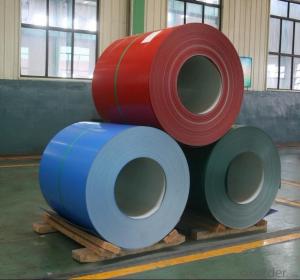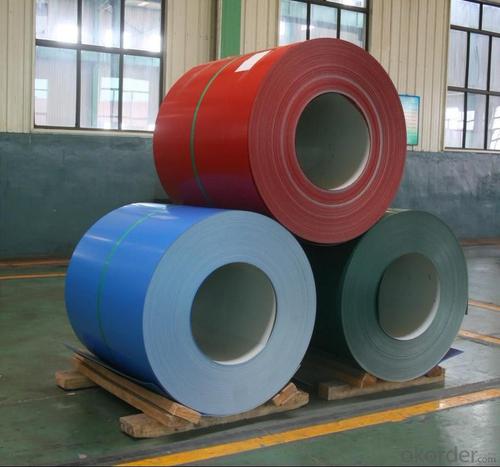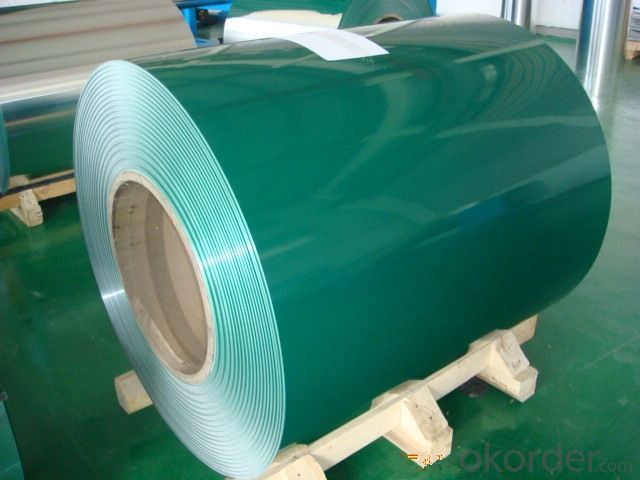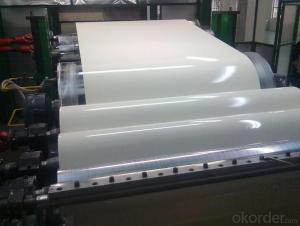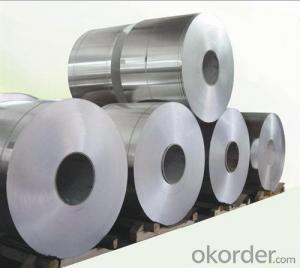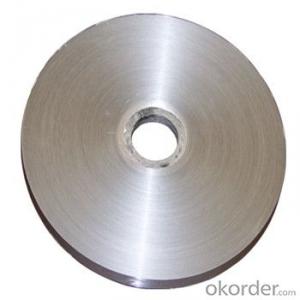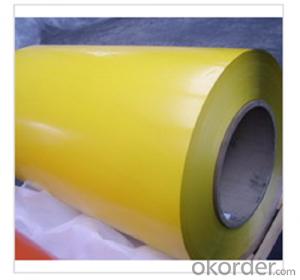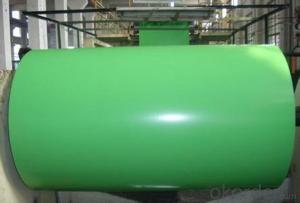Painted Aluminum Coil Stock for Coated Aluminum Tape for Aluminum Ceilings
- Loading Port:
- Shanghai
- Payment Terms:
- TT OR LC
- Min Order Qty:
- 5 m.t.
- Supply Capability:
- 60000 m.t./month
OKorder Service Pledge
OKorder Financial Service
You Might Also Like
Specification
Coated Aluminium Tape for Aluminium Ceilings
Description
Alloy | 1060, 1100, 3003, 8011, etc. |
Temper | H16, H18, H24, H26, H28 |
Thickness | From 0.05mm to 3.0mm |
Width | Standard width:1240mm |
Special width:1300mm, 1520mm, 1570mm, 1595mm | |
Diameter | Standard dia:1200mm |
Interior dia:150mm,405mm,505mm | |
Weight | 2.5 T/coil,3.0 T/coil |
Coating | PE, PVDF, ACRYLIC |
Surface | Embossed, mill finish, coated |
Color | AS to code RAL |
Gloss | 10-90%(EN ISO-2813:1994) |
Coating Thickness | PE: more than 18 micron |
PVDF: more than 25 micron | |
Coating Hardness(pencil resistance) | More than 2h |
Coating adhesion | 5J (EN ISO-2409:1994) |
Impact Resistance | No peeling or cracking(50 kg/cm,ASTMD-2794:1993) |
Flexibility(T-bend) | 2T |
MEK resistance | More than 100 |
Advantage | 1.High temperature resistant 2.Weathering resistant 3.Scrubbing resistant 5.Acid or alkali proof 6. Fireproof 7.Light weight material is easy to construct and install |
Out package | Wooden splint with export standard |
Application | ACP, wall cladding, facades, roofs and canopies, ceilings, signboards, blind window, display platforms, electrical panels, etc |
Manufacturing
Decoiler → Accumulator →Tension Leveler →Acid & Alkali Cleaner → Rinse →Conversion Treatment → Priming coater →Infrared Curing Oven →Main coater →Floatation Curing Oven →Strippable Film Applicator → Exit Accumulator → Recoiler
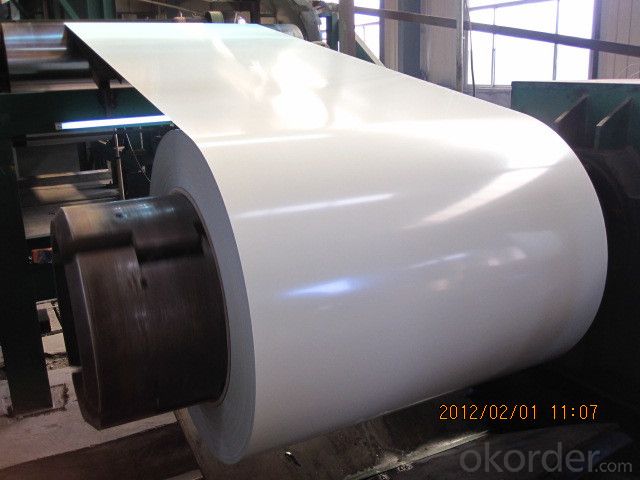
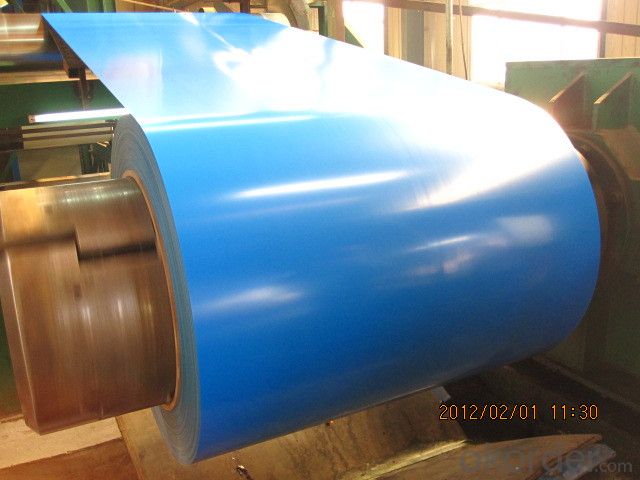
Polyester Coatings (PE)
PE (polyester) coatings exhibit an excellent combination of hardness, flexibility, flow, appearance, and superior resistance to dirt retention in indoor and outdoor applications. These coatings are highly resistant to abrasion, metal marking, staining, and marring, and require minimal maintenance. Glazetech uses polyester paints which provide excellent colour and gloss retention properties.
Polyvinylidene Fluoride Coatings (PVDF)
PVDF (polyvinylidene fluoride) is a chemical resistant thick film barrier coating commonly used in architectural applications where both excellent appearance and substrate protection must be maintained over a long period of time. This coating is unaffected by most chemicals and solvents and has excellent wear and abrasion resistance. PVDF also has a high dielectric strength, excellent resistance to weathering and the ability to self extinguish.
Application
Widely used in manufacturing of products as well as other industrial applications like:
Products Materials: PP cap stock, the traffic sign, air-conditioner heat and exchangers, food container, household foil, pharmaceutical packing, cigarettes packing etc.
Building Materials: aluminum curtain wall base plate, ACP, aluminum, ceilings, aluminum sheets, honeycomb panels and aluminum roofing, lighting decoration, household electrical appliances, food package (such as pop can cover & ring-pull), furniture ect.
FAQ
--Q: Do you provide free samples?
--A: Yes, free samples will be sent to you on freight at destination.
--Q: Can I get your latest products catalogue?
--A: Yes, it will be sent to you in no time.
--Q: What is the MOQ?
--A: 2 tons
--Q: What are your payment terms?
--A: We accept L/C, T/T.
--Q: What kinds of alloy can you supply?
--A: 1000 series: 1050, 1060, 1070, 1100, 1145, 1200
3000 series: 3003, 3004, 3105, 3104
5000 series: 5052, 5083, 5754, 5182
6000 series: 6061, 6063, 6062, 6063
8000 series: 8011, 8021
--Q: What kinds of temper can you supply?
--A: O-H112: O,H12,H14,H16,H18,H22,H24,H26,H,32,H34,H111,H112
T3, T4, T6
- Q: I have my brother's old wooden crutches but i see everyone using aluminum and i have the option to get aluminum ones. Is there any reason why they'd be better then my wooden ones?
- Aluminum are lighter..........And I guess after a day of using Wooden Crutches...you can get really tired because of the exra weight your lugging around.
- Q: This question is asking for a comparison of various types of aluminum coils, highlighting their unique characteristics and uses.
- <p>Aluminum coils are differentiated by their thickness, alloy composition, surface treatment, and temper. Common types include 1000 series coils with high purity, 3000 series known for formability, 5000 series for corrosion resistance, and 6000 series for strength. Thickness varies from thin gauges used in packaging to thick ones for construction. Surface treatments can include anodizing, painting, or lacquering for enhanced properties. Temper refers to the hardness and strength, with 'H' for hard and 'O' for soft tempers. Each type serves specific industries, such as automotive, aerospace, construction, and packaging.</p>
- Q: What is the lifespan of aluminum coils?
- The lifespan of aluminum coils can vary depending on various factors such as the quality of the aluminum, the manufacturing process, the environmental conditions they are exposed to, and the maintenance provided. However, on average, aluminum coils can last anywhere from 15 to 30 years. With proper care and regular maintenance, including cleaning and inspection, aluminum coils can potentially have an extended lifespan. It is important to note that regular maintenance and servicing by professionals can help identify any issues early on, allowing for timely repairs or replacements, ultimately prolonging the lifespan of aluminum coils.
- Q: What are the different packaging options available for aluminum coils?
- Customers have several packaging options to choose from for aluminum coils, depending on their specific needs and requirements. Some commonly used packaging options include: 1. Wooden crates: Sturdy wooden crates offer maximum protection for aluminum coils during transportation and storage. These crates are made of high-quality wood and designed to withstand rough handling, preventing coil damage. 2. Cardboard boxes: Smaller aluminum coils can be packaged in lightweight and cost-effective cardboard boxes. These boxes provide adequate protection against minor impacts and environmental factors. 3. Steel or aluminum skids: Aluminum coils can be placed on steel or aluminum skids for packaging. Skids provide a stable base and allow for easy handling using forklifts or pallet jacks. They are commonly used for larger coils or when transporting multiple coils together. 4. Stretch wrap: Stretch wrap is a popular choice for packaging aluminum coils. It offers excellent protection against dust, moisture, and scratches. The coils are tightly wrapped in plastic film, ensuring secure transportation. 5. Custom packaging: In certain cases, customers may require customized packaging solutions to meet specific requirements. This can include using protective covers, foam padding, or additional reinforcements to ensure safe handling and delivery of the aluminum coils. It is important to consider factors such as coil size, weight, transportation method, and intended use when choosing a packaging option. Working with a reputable packaging provider can help determine the most suitable packaging option for aluminum coils.
- Q: Aluminum alloy coil quotation = = how much is the price?
- Driving route: About 77.9 kilometersStarting point: Ji'nan City1. from the starting point to the west direction, along the two road 210 meters, turn right into the weft three road2. along the weft three road 350 meters, turn left into the road3. along the road 2 km, slightly turn right into the two road4. along the two road 730 meters, slightly to the right, into the Huai Village Street5., along the Huai Village Street 490 meters, into the six road6. along the six road drive 1.4 kilometers, turn left into paragraph Hing West Road7., along the paragraph West Hing Road 620 meters, turn right in front of the road through ten8. along the ten road drive 4.6 kilometers, toward Beijing Taiwan high-speed / Tai'an / Liaocheng / Dezhou direction, a little right turn into the big friend automobile bridge9., along the great friend car bridge 1.6 kilometers, crossing Ji'nan West interchange, front turn right into the Canton Expressway10., along the expressway
- Q: How do aluminum coils contribute to improved building aesthetics?
- Aluminum coils contribute to improved building aesthetics in several ways. Firstly, aluminum coils can be used to create sleek and modern exterior finishes for buildings. The coils can be coated with various finishes such as brushed, anodized, or painted, allowing for a wide range of design possibilities. This versatility in finishes helps architects and designers achieve their desired aesthetic vision for the building. Additionally, aluminum coils can be easily shaped and formed into various profiles, giving buildings a unique and customized look. The coils can be bent, cut, or perforated to create intricate patterns or architectural details, enhancing the overall aesthetics of the structure. This flexibility in shaping allows for creative and visually appealing designs that can make a building stand out. Moreover, aluminum coils are lightweight yet durable, making them an ideal choice for cladding systems. By using aluminum coils as exterior cladding, buildings can achieve a modern and clean appearance. The lightweight nature of aluminum coils also makes installation easier and more cost-effective, ultimately contributing to improved building aesthetics. Furthermore, aluminum is a highly recyclable material, which aligns with sustainable building practices and environmentally friendly designs. Buildings incorporating aluminum coils can be seen as more visually appealing due to their eco-friendly attributes, reflecting the values of the project and its occupants. In conclusion, aluminum coils contribute to improved building aesthetics by providing a wide range of finishes, allowing for creative shaping and customization, offering lightweight and durable cladding options, and promoting sustainable design practices.
- Q: I HEARD THAT ALUMINUM POWDER TIGHTEN YOUR VAGINA BUT WHERE DO I BUY IT AND HAVE ANY ONE HEARD OF BEYDARY PILLS, I HEARD THEY TIGHTEN YOUR VAGINA ALSO AND WHERE CAN I BUY THEM
- It's not aluminum powder; it's ALUM powder, which is a different chemical. However, it doesn't really tighten your vagina, despite what some ads will say. I have not heard of beydary pills, but I also doubt that they would do anything to fix the problem either. If a real vaginal shrinking pill was available, it would be well-known and very popular, just like viagra is. Your best bet is to do kegel exercises to strengthen and tone your vaginal muscles. These, and nothing else, can help make your vagina tighter.
- Q: What precautions should be taken when handling aluminum coils to ensure safety?
- <p>When using aluminum coils, safety measures include wearing appropriate personal protective equipment such as gloves and safety glasses to prevent cuts and eye injuries. Ensure the work area is well-ventilated to avoid inhaling fumes from any processes involving the coils. Keep the coils dry to prevent electrical hazards. Use proper handling equipment to avoid back injuries from heavy loads. Always follow the manufacturer's guidelines for the specific aluminum coil products being used. Regularly inspect the coils for any signs of damage or wear that could lead to accidents.</p>
- Q: This question asks for methods to prevent corrosion on aluminum coils during storage or transportation.
- <p>To prevent corrosion on aluminum coils during storage or transportation, follow these steps: 1. Store the coils in a dry, clean environment to avoid moisture and dirt. 2. Use protective wrapping or covers to shield the coils from moisture and contaminants. 3. Ensure proper ventilation in storage areas to prevent condensation. 4. Avoid stacking coils directly on the ground; use pallets or racks to keep them off damp surfaces. 5. Handle the coils carefully to prevent scratches or damage that could lead to corrosion. 6. Regularly inspect the coils for signs of corrosion and address any issues promptly. 7. Consider using anti-corrosion coatings or treatments on the coils if they will be stored for extended periods. By following these guidelines, you can minimize the risk of corrosion and maintain the integrity of your aluminum coils.</p>
- Q: What are the elements and compounds that make up aluminum coils?
- <p>Aluminum coils are primarily composed of the element aluminum (Al), which is a lightweight, silvery-white, and ductile metal. Pure aluminum is relatively soft, so it is often alloyed with other elements to improve its strength and durability. Common alloying elements include copper, magnesium, manganese, silicon, and zinc. These elements can enhance properties like strength, formability, and resistance to corrosion. The specific composition of an aluminum coil can vary depending on the alloy type and the intended application, but the primary component will always be aluminum.</p>
Send your message to us
Painted Aluminum Coil Stock for Coated Aluminum Tape for Aluminum Ceilings
- Loading Port:
- Shanghai
- Payment Terms:
- TT OR LC
- Min Order Qty:
- 5 m.t.
- Supply Capability:
- 60000 m.t./month
OKorder Service Pledge
OKorder Financial Service
Similar products
Hot products
Hot Searches
Related keywords
